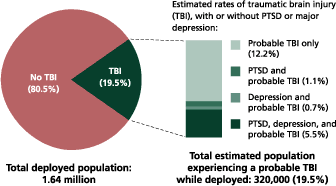The Effect of Sensory Enhanced Hatha Yoga on Symptoms of Combat Stress in Deployed Military Personnel. Stoller, C.C., Greuel, J.H., Cimini, L.S., Fowler, M.S., & Koomar, J.A.Ame
OBJECTIVE. We examined the effects of sensory-enhanced hatha yoga on symptoms of combat stress in
deployed military personnel, compared their anxiety and sensory processing with that of stateside civilians,
and identified any correlations between the State–Trait Anxiety Inventory scales and the Adolescent/Adult
Sensory Profile quadrants.
METHOD. Seventy military personnel who were deployed to Iraq participated in a randomized controlled
trial. Thirty-five received 3 wk (39 sessions) of sensory-enhanced hatha yoga, and 35 did not receive any
form of yoga.
RESULTS. Sensory-enhanced hatha yoga was effective in reducing state and trait anxiety, despite normal
pretest scores. Treatment participants showed significantly greater improvement than control participants on
16 of 18 mental health and quality-of-life factors. We found positive correlations between all test measures
except sensory seeking. Sensory seeking was negatively correlated with all measures except low registration,
which was insignificant.
CONCLUSION. The results support using sensory-enhanced hatha yoga for proactive combat stress
management.
research
statistics


Nearly one in five Vietnam veterans suffered post-traumatic stress disorder (PTSD) — and nearly one in 10 was still suffering 11 to 12 years after the war, a new study finds. That's fewer PTSD cases than once feared. But it is still a lot — with implications for Iraq war veterans, finds Columbia researcher Bruce P. Dohrenwend, Ph.D., and colleagues. "Substantial similarities exist between Vietnam then and Iraq now," Dohrenwend and colleagues note. "Both have been wars without fronts in which it is often difficult to tell peaceful civilians from enemy combatants."
The study appears in the Aug. 18 issue of the journal Science. Lingering Trauma Long after a life-threatening event, PTSD can cause flashbacks — vivid, disturbing memories of the trauma — as well as sleep problems, nightmares and panic attacks. People with PTSD may feel detached, guilty, or paranoid. They often suffer depression and are at increased risk of suicide. In the 1980s, it became apparent that many Vietnam veterans were suffering PTSD symptoms. Exactly how many was controversial. There were charges that some of these veterans were claiming to have PTSD in order to get undeserved disability benefits.
In 1988, there were two conflicting studies. The CDC said about 15 percent of veterans ever had PTSD, and only about 2 percent still had it. The National Vietnam Veterans' Readjustment Study (NVVRS) found that 31 percent of Vietnam vets suffered PTSD, with 15 percent still suffering — seven times the CDC's estimate. Dohrenwend and colleagues did something neither the CDC nor the NVVRS did. They developed a measure of veterans' probable severity of exposure to war-zone stress. To do this, they analyzed military personnel data along with data from military archives and historical records. The researchers reanalyzed the NVVRS data. Their findings: The NVVRS overestimated PTSD rates and the CDC underestimated PTSD rates. There was very little evidence of veterans falsely claiming to have PTSD.
"Substantial" numbers of Vietnam veterans suffered PTSD: 18.7 percent of all Vietnam veterans. As of 1990, 9.1 percent of all Vietnam veterans still suffered PTSD. The more war trauma a veteran experienced, the higher a veteran's odds of having PTSD. Most veterans who experienced very highly traumatic events did not develop PTSD. "We found little evidence of falsification by veterans, an even stronger dose-response relationship than previously reported, and substantial adverse psychological consequences of the Vietnam war," Dohrenwend said in a news release. "Although our study points to resiliency of most veterans, the findings highlight the need for further research on [long-lasting psychological problems] in victims of war-related trauma."
In an editorial accompanying the Dohrenwend study, Harvard anxiety-disorder expert Richard J. McNally, Ph.D., praises the researchers for their solid scientific work in an emotion-charged area of research. He also notes that the PTSD issue is far from over for America's veterans. From 1999 to 2004, he notes, the number of veterans receiving disability compensation for PTSD increased by nearly 80 percent. "Does this indicate an upsurge of delayed-onset PTSD, a reactivation of symptoms among veterans approaching retirement, or delayed presentation of PTSD among those who have suffered for decades and are only now seeking the help they need?" he asks.
SOURCES: Dohrenwend, B.P. Science, Aug. 18, 2006; Vol. 313: pp. 979-982. McNally, R.J. Science, Aug. 18, 2006; Vol. 313: pp. 923-924.

